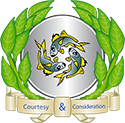Title
“A book is a dream that you hold in your hand.” – Neil Gaiman

Our Subject Leader for Reading is Mrs Murray.
Reading at Fishburn: At a Glance
At Fishburn Primary School, we want every child to become a fluent, confident reader who enjoys reading for pleasure and can understand and discuss a wide range of texts.
We develop strong readers through:
✅ systematic early reading and phonics
✅ daily fluency and comprehension practice
✅ high-quality texts and a carefully chosen reading spine
✅ a strong culture of reading for enjoyment
Intent
Our reading curriculum is designed so that every child:
- develops early reading confidence through phonics
- becomes a fluent, accurate reader
- builds strong comprehension skills
- enjoys books and develops a love of reading
- develops vocabulary and knowledge to support learning across all subjects
Early Reading and Phonics (Nursery – Year 2)
We teach early reading using Little Wandle Letters and Sounds Revised, a systematic synthetic phonics programme.
- Nursery: Foundation for Phonics
- Reception and Year 1: daily discrete phonics sessions and frequent reading practice
- Year 2: daily phonics sessions and reading practice where needed
Children read books that are carefully matched to their phonics knowledge so that they can read confidently and build fluency.
Reading from Years 3–6
From Year 3 to Year 6, reading is taught daily through a structured reading cycle which prioritises:
- fluency
- language development (oracy)
- reading comprehension
Comprehension (VIPERS)
Children develop comprehension through daily reading lessons, using the VIPERS approach:
- Vocabulary
- Inference
- Predict
- Explain
- Retrieve
- Summarise
Children answer a wide range of question types and learn to justify their answers using evidence from the text.
Fluency (Reading EARS)
We develop fluency using the DfE Reading EARS approach:
- Accuracy
- Automaticity
- Prosody
- Oracy
Children may read key texts more than once and take part in:
- echo reading
- choral reading
- teacher modelling
- Readers’ Theatre
- discussion and drama techniques
Reading for Pleasure
At Fishburn, all staff promote reading for pleasure through:
- book recommendations and quality reading interactions
- inviting reading displays
- shared reading assemblies
- diverse texts and a well-stocked library
All children enjoy a daily story time where an adult reads aloud to the class.
Our Reading Spine
Our reading spine is organised around the Eden curriculum, immersing children in different eras, topics and themes locally and globally. This strengthens vocabulary, knowledge and understanding across the curriculum.
Assessment & Support
We use rigorous assessment and timely intervention to ensure all pupils succeed.
- Reception and Year 1: assessed every three weeks using the Little Wandle assessment tool
- Years 2–6: termly standardised assessments (NTS)
- weekly comprehension checks (e.g. CGP 10-minute tests) and comprehension workshops support planning and intervention
For the lowest 20% of readers, children are heard reading aloud every day. We believe in a keep up, not catch up approach and work closely with parents to support reading at home.
✅ Reading at Home: Parent & Carer FAQs
How can I support reading at home?
You can support your child by:
- hearing them read regularly
- discussing characters, events and vocabulary
- asking questions about the story
- reading aloud to them for enjoyment
Why is fluency important?
Fluent reading helps children focus on understanding the meaning of a text, not just reading the words.
What is VIPERS?
VIPERS is how we teach comprehension skills: Vocabulary, Inference, Predict, Explain, Retrieve and Summarise.
✅ Useful Links
- Reading Policy
- Little Wandle Parent Support
- Reading at Home guidance
- Recommended Reads / Reading Spine

